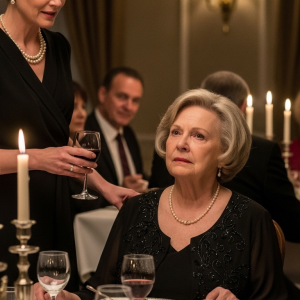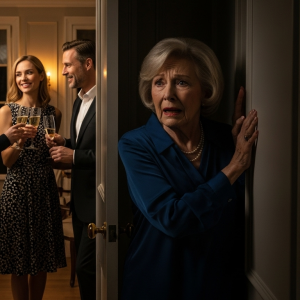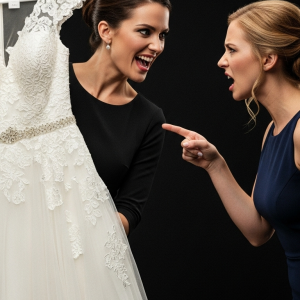The cream-colored envelope arrived on a Tuesday morning, its weight—thick and expensive—a foreign object between my fingers. I recognized Cathy’s handwriting immediately: that precise, controlled script perfected in private school, the one that always looked like it was judging you. My coffee grew cold as I stared at my name, written in stark black ink. Mrs. Elaine Mack. Not Mom, not Mother. Just my formal name, as if I were a distant relative she barely knew.
I should have thrown it away. I should have recognized the warning signs in the heft of the paper, the way my daughter’s return address was embossed in gold lettering. But I was still clinging to hope then, still believing that somewhere beneath her designer clothes and cold demeanor lived the little girl who used to crawl into my bed during thunderstorms.
The kitchen felt smaller as I slid my finger under the flap. The morning light filtering through my modest apartment’s windows seemed to dim. Inside was not an invitation, not a letter, but a single, professionally printed sheet of paper. An invoice.
- Professional Wedding Planning Services: $35,000
- Honeymoon Expenses (Tuscany, 3 Weeks): $35,000
- Total Due: $70,000
- Payment Due in 30 Days
At the bottom, in Cathy’s careful handwriting, a single sentence was scrawled. “You should feel lucky I’m letting you contribute at all. After everything you’ve put this family through, this is the least you can do.” The words swam before my eyes, their meaning a blade twisting in my gut. My daughter, my only child, was charging me for a wedding I hadn’t been invited to.
The coffee mug slipped from my numb fingers, shattering against the linoleum floor. Brown liquid spread across the white tiles like spilled blood. For twenty-seven years, I had been a mother. And this was my return on investment. Not a phone call, not an invitation, but a bill for a privilege I was meant to be grateful for.
Kneeling on the floor, picking up pieces of broken ceramic, I understood. I wasn’t her mother anymore. I was a wallet she occasionally remembered to shake down. The realization should have destroyed me. Instead, something cold and calculating settled in my chest. The invoice fluttered to the floor, and I left it there among the coffee stains. It belonged in the mess.
In the hallway mirror, I saw the woman I had become: gray hair in a simple bun, lines around my eyes from sleepless nights worrying about an ungrateful daughter. I looked like what I was: a woman who had spent her life making herself smaller so others could feel bigger. But my eyes… my eyes were different. They held a fire I hadn’t seen in years. Fury.
I opened my laptop and began to type. Not a check, not a plea, but a plan. My fingers moved with purpose, each keystroke deliberate. I researched wedding venues in Westchester, cross-referencing dates with social media posts I was blocked from but could access through mutual friends. I found the resort in Tuscany, the one with private villas and astronomical nightly rates.
By evening, I had a complete picture of my daughter’s dream. Every detail, every expense, every vendor. I poured myself a glass of wine—not the cheap bottle I usually bought, but the good one I’d been saving. This was a special occasion. I sat at my clean kitchen table, the invoice still polluting the floor, and made a list of phone numbers.
My first call would be to Cathy’s wedding planner, a woman named Christine Slaughter. Then the resort, the caterer, the florist. All of them expecting payment from someone who thought I was nothing more than a convenient ATM. A smile touched my lips; it felt like flexing a muscle I’d forgotten I had. Cathy wanted me to contribute. Fine. I would contribute. Just not in the way she imagined.
I picked up the phone and dialed. A woman answered, her voice professionally warm. “Slaughter Wedding Planning, this is Christine.”
“Hello, Christine,” I said, my voice steady as granite. “My name is Elaine Mack. I’m calling about the Herman-Green wedding. I’m Cathy’s mother.”
“Oh, Mrs. Mack! How wonderful to hear from you. Cathy mentioned you might be contributing.”
“I’m sure she did,” I replied, my tone giving nothing away. “I’d like to discuss the arrangements. When would be a good time to meet?”
“Would tomorrow work? I have an opening at two.”
“Perfect,” I said. “I’ll see you then.” I hung up and took a sip of the deep red wine. It burned its way down, warming the cold place where my heart used to be. Tomorrow, I would begin to teach my daughter about consequences. But tonight, I would plan. In my dreams, I was standing in a garden at sunset, watching something beautiful burn.
Christine Slaughter’s office was exactly as I’d pictured: cream walls, gold accents, and furniture that cost more than my car. I’d chosen my outfit carefully—a navy dress, my late mother’s pearl necklace. Understated elegance that whispers money, rather than screaming it. I wanted to look like a woman who could write a $70,000 check without blinking.
“Mrs. Mack, please, have a seat,” Christine greeted me with practiced warmth. “Coffee?”
“Coffee would be lovely,” I said, settling into the plush chair. She poured from an elegant silver service, her movements rehearsed.
“I have to tell you,” she gushed, “your daughter has exquisite taste. The Riverside Manor is simply stunning for an October wedding.”
“Tell me about the timeline,” I said, accepting the delicate china cup. “When is the wedding?”
“October 15th, just three weeks away. Of course, Cathy mentioned you might be traveling, which is why you won’t be able to attend.” Her tone was carefully neutral, but I heard the question disguised as a statement.
“Something like that,” I replied, letting the silence hang in the air. I set down my coffee cup with deliberate precision. “Christine, I’m afraid there’s been some confusion.”
The sparkle in her eyes dimmed. “Confusion?”
“I never agreed to pay for my daughter’s wedding or honeymoon. In fact, I wasn’t even invited to the wedding.” The words landed with the force of stones dropped into a still pond. I watched the ripples spread across her face.
“Oh,” she blinked, her professional composure cracking. “But Cathy said… she told me you were eager to contribute, that you felt terrible about missing the ceremony.”
“Did she really?” I leaned forward, my voice a conspiratorial whisper. “Tell me, Christine, who signed the contracts for this wedding?”
Her face went pale. “Cathy and Gary. But she assured me you would be handling the payments for these items.”
I pulled the neatly folded invoice from my purse. “This arrived yesterday. No phone call, no discussion. Just a bill with a charming note about how lucky I should feel.”
She stared at the paper, the calculations running behind her eyes. Deposits made, vendors booked, her own commission hanging in the balance. “Mrs. Mack, I… I had no idea. Did she pay you anything upfront?”
“A small deposit. Five thousand. The rest was supposed to come from you this week.”
“And what happens,” I asked softly, “if those payments don’t materialize?”
Her voice was a whisper. “Without payment, we can’t provide the services. The venue, the catering, the flowers… If the payments don’t come through, there would be… no wedding.”
I sat back, letting her absorb the reality. Cathy had built her dream on a foundation of my presumed guilt and compliance. She had counted wrong.
“Christine,” I said, my voice now gentle, motherly. “This isn’t your fault. My daughter has put you in a terrible position.” I stood, smoothing my dress. “When my daughter calls—and she will—I want you to tell her exactly what you told me: without the payments I was supposedly making, there will be no wedding. Then, I want you to give her my phone number and tell her that if she wants to discuss this, she needs to call me directly.”
I paused at the door. “Don’t feel bad about any of this. You’re a businesswoman. You deserve to be paid for your work. Just not by me.” I left her sitting there, staring at the invoice like it was evidence in a criminal trial.
Janet Waters answered on the second ring. She’d been my neighbor when Cathy was small, back before life got complicated. Her daughter, Rosa, had been Cathy’s best friend until high school, when my daughter decided Rosa’s family wasn’t prestigious enough for her social ambitions.
“Elaine! My God, it’s been forever!”
“Janet, I have a favor to ask. Do you still have Rosa’s number? I heard she’s a wedding photographer now.”
“She is! Has her own business and everything. She’d love to hear from you.”
Rosa met me at a cafe in Tarrytown, her smile just as genuine as I remembered. She approached my table with her arms already open. “Mrs. Mack,” she said, “you look wonderful.”
“Please, call me Elaine,” I said, embracing her. After some pleasantries, I got straight to the point. I showed her the invoice. Rosa’s expression shifted as she read, her jaw tightening.
“Seventy thousand dollars? For a wedding you weren’t invited to?” Her voice was laced with the outrage I hadn’t let myself fully feel. “That’s… that’s beyond cruel, Elaine. That’s sociopathic.”
“I want you to photograph her wedding,” I said. “From a distance. The Riverside Manor has public areas where a photographer could work without trespassing. I want documentation of every moment of the seventy-thousand-dollar celebration I’m supposedly paying for but not allowed to attend.”
Rosa didn’t hesitate. “I’ve photographed there before. I know the grounds. It’s not illegal.” Her smile turned grim. “Lately, I’ve been getting some interesting requests. Divorce documentation, infidelity cases. Turns out my eye for candid moments is useful for more than just wedding bliss.”
I then told her about my meeting with Christine, about the payments that weren’t coming, about the house of cards that was about to collapse. “So when you don’t pay,” Rosa concluded, her eyes wide with amazement, “there won’t be a wedding.”
“Exactly. And I want proof of the consequences of her choices. Not just for revenge,” I admitted, “but for my own peace of mind. I need to see that actions have consequences, even for people who think they’re above them.”
Rosa reached across the table and covered my hand with hers. “Elaine, I’ll help you. And I’ll teach you everything I know about documenting things, about protecting yourself. You deserve to be protected.” We spent the next hour planning, and as we left, she handed me her card. “Day or night, if things get ugly, you call me.”
The calls started three days later. First, from Gary, her husband-to-be. His voice on my answering machine was tight with panic. “Elaine, it’s Gary. There seems to be some confusion about the wedding payments. Call me back.” I didn’t.
By the fourth day, Cathy herself finally condescended to contact me via voicemail, her voice ice wrapped in silk. “Mother, I don’t know what game you’re playing, but it stops now. Our wedding planner says you’re refusing to honor your commitments. Whatever petty grievance you’re nursing needs to take a backseat to what’s important here.”
I marveled at her ability to frame herself as the victim. Later that evening, my phone rang. It was Cathy. I answered.
“Mother, finally. We need to meet. Tonight.”
“Hello, Cathy. How are you?”
“How am I?” Her voice pitched higher. “I’m dealing with a crisis because my mother has apparently lost her mind!”
“I’m not playing games, sweetheart,” I said calmly. “I’m simply not paying for a wedding I wasn’t invited to.”
The silence stretched. When she finally spoke, her voice was deadly quiet. “You weren’t invited because we knew you’d make it about yourself. We knew you’d find some way to cause drama or make everyone uncomfortable with your situation.”
“My situation?”
“Living in that tiny apartment, wearing those clothes… Gary’s family has a certain standard, and frankly, we weren’t sure you could blend in.” The words were meant to be blows, but all I felt was a cold, merciless clarity.
“I see,” I said. “So you excluded me because I might embarrass you, but you still expected me to pay for it.”
“You’re twisting everything! We thought it would be easier for everyone if you contributed financially instead of attending.”
“Easier for whom, exactly?” I asked. The line went quiet again, and I could almost hear the gears turning in her head, trying to spin this into a favor she had done for me.
“Look,” she said, her voice shifting to the wheedling tone she used when she wanted something. “I know the invoice was poorly worded. I was stressed. But you’re my mother. Don’t you want to see me happy?”
“I want to see you become a person I can be proud of,” I said, my voice soft but firm. “Someone who treats others with kindness and respect. But that’s not who you are right now, is it?”
“You’re being ridiculous!”
“Then you should be relieved that I won’t be paying, either.” I hung up before she could respond. The phone immediately started ringing again. I turned off the ringer and let it flash, a beacon of her panic in my quiet apartment.
October 15th dawned gray and cold. Rosa texted at 6 a.m.: Venue looks chaotic. Vendor trucks leaving. Still want me there? My reply was immediate: Yes. Document everything.
The doorbell rang at 11:30. Through the peephole, I saw them. Cathy, in pajamas with a coat thrown over them, her hair a mess. Gary, looking haggard behind her. I opened the door but blocked the entrance.
“Mother,” Cathy’s voice was hoarse. “My wedding is ruined. The caterers, the florist, the photographer… they’re all gone.”
“That sounds stressful,” I said calmly. “What does this have to do with me?”
Gary stepped forward, his face flushed. “Cut the act, Elaine. You’re deliberately sabotaging our wedding.”
“I’m not sabotaging anything,” I corrected him gently. “I’m simply not paying for it. There is a very important difference.”
“It’s the same outcome!” Cathy snarled. “Do you have any idea what this is costing us? Reputation! Gary’s family is already at the hotel!”
“And what are you telling them?” I asked.
“The truth,” Gary said coldly. “That Cathy’s mother decided to punish her by pulling funding at the last minute.”
“Is that the truth?” I met his gaze. “Or is the truth that you planned a wedding you couldn’t afford, assumed I would pay for it without asking, and are now facing the consequences?”
Cathy’s eyes filled with real tears. “Please, Mom. I’m begging you. I know I handled this wrong. Just for today… can’t we fix this and figure out the rest later?” For a moment, the old guilt pulled at me. It would be so easy to write the check, to restore the peace.
But then I remembered the note. You should feel lucky.
“Kathy,” I said softly, “What happens after the wedding? Would I be invited to Christmas? Or would I go back to being the embarrassing mother you keep at arm’s length until you need money again?”
The silence between us was a chasm. I saw in her eyes that she had no answer.
“What do you want from me?” she finally whispered, her voice muffled against Gary’s shoulder. “What will it take to fix this?”
“I want you to understand that this isn’t about money. It’s about respect. It’s about treating your mother like a person instead of a resource.”
“I can learn!”
“Can you? This is who you’ve been for years. The only difference is that this time, there are consequences.” I stepped back and began to close the door. “I hope you both learned something today.”
“Wait!” Cathy pushed away from Gary, her face desperate. “What if we postponed? Planned a smaller wedding, one we could afford? What if I invited you… properly?”
I paused, my hand on the door. “Answer honestly, Cathy. If I couldn’t contribute a single dollar to your life, would you want me in it at all?”
The fact that she had to think about it was the only answer I needed.
“I thought so,” I said softly. “Goodbye, Cathy.” I closed the door and engaged the deadbolt, listening as her broken sobs faded down the hallway.
My phone rang. It was Rosa. “Elaine, I just saw them leave. Are you okay?”
“I’m perfect,” I said, and realized with a shock that I meant it. “How did it go?”
“Comprehensive,” she said. “Vendors leaving, guests being turned away, a very public meltdown in the parking lot. I got it all.” She paused. “There’s something else. I got a call from Janet Waters. She wants to hire me to photograph her 50th wedding anniversary party. Apparently, she’s been telling everyone about my work.”
I walked to my kitchen window. The rain had stopped, and a thin, watery sunlight was breaking through the clouds. Somewhere across town, my daughter was learning a hard lesson. But here, in my small, clean apartment, I was learning what it felt like to value myself enough to demand respect. For the first time in years, I felt like I was exactly where I belonged.




